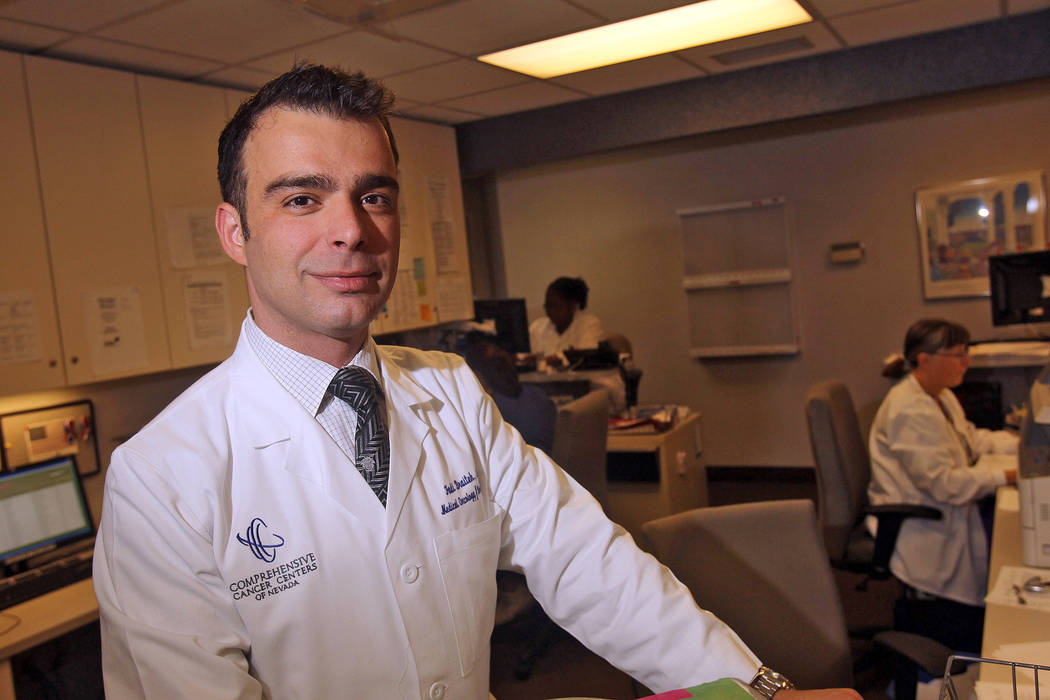New treatments bring hope to patients
One in eight women will find themselves confronted with a diagnosis of breast cancer, according to the American Cancer Society. A diagnosis is not necessarily dire. As a result of medical advancements, successful treatment options exist for patients with early to advanced stages of the disease.
Early-stage diagnosis
Dr. Fadi Braiteh, director of the Translational Oncology Program at Comprehensive Cancer Centers, oversees research of early clinical trials working to bring new treatment methods to market. According to him, two new treatments have recently been approved for patients diagnosed during the early stages of breast cancer.
One breakthrough is for women diagnosed in the early stages of HER2-negative, hormone receptor-positive breast cancer. In this case, patients may no longer require chemotherapy after surgery. According to Braiteh, a personalized test on a patient’s cancer tumor predicts if she will benefit from chemotherapy.
Several women in the Las Vegas area participated in the clinical trial that has been ongoing for the past decade. In June, the results of this trial, known as the TAILORx, were reported.
“This is good news for patients,” Braiteh said. “We can spare them the unnecessary toxicity and cost.”
This treatment requires that patients adhere to the rest of their treatment plan, including five to seven years of anti-estrogen treatment.
In another new development, breast cancer patients with early-stage HER2-positive can reduce the risk of cancer progression by taking the drug neratinib (Nerlyx) for one year following traditional chemotherapy. Neratinib has been approved by the FDA as “extended” adjuvant therapy.
“One out of four women in this particular category risk a recurrence in breast cancer over the following five years,” Braiteh said about treating the aggressive form of breast cancer. “Hence there have been attempts to explore what additional treatment can help improve the outcome.”
Advanced cancer treatment
For patients with advanced cancer that has metastasized to other parts of the body, there are several treatment developments and ongoing clinical trials. As of 2017, olaparib, a drug previously used for ovarian cancer, has been approved for patients with advanced breast cancer who are harboring a germline mutation or defect of breast cancer susceptibility gene (BRCA).
“A person who is born with a defect is at higher risk than others to develop breast cancer,” Braiteh said. “Around one in 500 healthy individuals are the carrier of such a defect.”
Olaparib belongs to the family of PARP inhibitors. That means it is from a group of pharmacological inhibitors of the enzyme poly ADP-ribose polymerase. PARP inhibitors decrease a cancer cell’s ability to repair itself after being damaged by other treatments.
Braiteh said patients respond to the pill better than chemotherapy.
For patients diagnosed with triple-negative breast cancer — where cancer cells lack estrogen, progesterone and HER2 receptors — treatment is traditionally limited. Currently, phases 2 and 3 clinical trials are going worldwide, focusing on treatment options for women in this category. Braiteh has seen some of his patients who participated in the early clinical trials experience positive results.
“It’s the immune-oncology drugs that are most promising for this group,” said Braiteh, who expects to hear results from these clinical trials within the next 18 months. “For these patients, there has been an effort to combine the newest category of compounds, immune-oncology such anti-PD1 and anti-PD-L1 with other standard chemotherapy or novel biologics.”
Patients with widespread, stage-4 hormone receptor-positive, HER2-negative breast cancer have seen positive results over the past three years while taking a new class of medicines known as CDK 4/5 inhibitors. The new medicines have received FDA approval and are being used in combination with anti-hormone therapy.
“This is the biggest advance in the last two years,” Braiteh said. “I have been treating a patient for three years and she hasn’t used chemotherapy yet.”
Clinical Trials
At the forefront of breakthroughs are ongoing tests for new treatments.
Currently, phase 1 and 2 clinical studies are occurring for a therapeutic class of treatment called CAR T-cell. This treatment has successfully been used for cases of leukemia and lymphomas.
“Patients specific subclass of immune cells (T-lymphocytes) are extracted from patient’s blood through a process called ‘apheresis,’” Braiteh said. “These cells are re-engineered to empower them to specifically recognize and attack the specific cancerous cell in question.”
Braiteh said that once the engineered T-lymphocytes are reinfused into the patient, they will adhere to the protein on the surface of the breast cancer cell. This method requires only one treatment and could have significant side effects.
“We are still about five years away from definitive results,” Braiteh said, “and possible availability outside of clinical trials.”


















